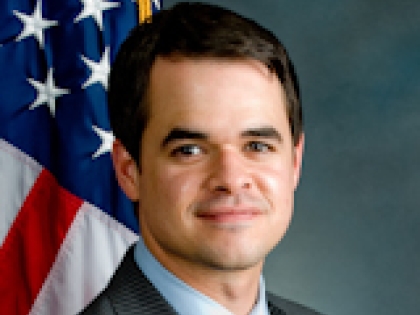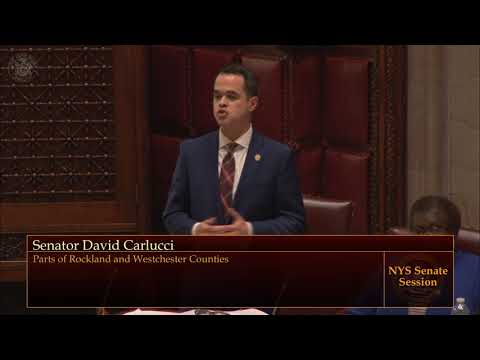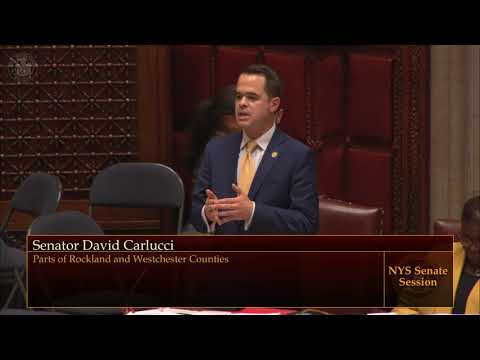
Senator Carlucci Joins Advocates, Doctors to Call for Restoring Prescriber Prevails to New York Medicaid Budget
David Carlucci
February 4, 2013
-
ISSUE:
- Mental Health
ALBANY, N.Y. – Senator David Carlucci today was joined by a coalition of mental health advocates, physicians and patients to call on Governor Cuomo to reinstate “prescriber prevails” for atypical antipsychotics in the 2013-2014 state budget via the 21-day amendments. The group also urged the Governor and Legislature to restore “prescriber prevails” for all drug classes in the Medicaid budget.
“Prescriber prevails” means the doctor or physician has authority to decide which medicine is best for their patients. A state Medicaid policy shift in October 2011 gave this authority to managed care health plans as opposed to prescribers. For some patients with complex medical conditions, it can take weeks or months – and careful consultation with their physician – to determine the most effective medication regimen.
Thus, this new policy has led to confusion, lack of uniformity in coverage, and some cases, denial of critical medications.
In 2012, “prescriber prevails” were restored for atypical antipsychotics for mental health patients. This year, Governor Cuomo proposes repealing this vital patient protection in his budget proposal after only 21 days of implementation. The governor also proposed removing “prescriber prevails” for all drug classes in Medicaid.
The NYS Medicaid budget office asserts the repeal of atypical antipsychotics will save $9.38 million and repealing “prescriber prevails” for all drug classes in Fee for Service will save $1.8 million in the upcoming fiscal year. Advocates dispute this claim and maintain the cost savings are much less.
In a news conference at the Capitol, participants detailed how this policy change has led, and will continue to lead to; disruptions in medication access, health complications for patients, and increased health care costs.
Senator David Carlucci, Chair of the Mental Health Committee said: “Taking away the ability for a doctor to prescribe a drug for treatment is a prescription for failure. Prescriber prevails is a necessary provision that ensures that anti-psychotic drugs are readily available and not held hostage to an insurance company health plan. Instead of putting this proposal on the chopping block, I believe we must continue to protect the welfare of all patients who rely upon sound professional advice and medicine that works.”
Charmaine Day, Host of “Lady Charmaine Live,” patient said: “By taking away doctors ability to prescribe atypical antipsychotic medications that work best for their patients, you are taking away the patient’s ability to live a decent life and be a part of society while sentencing them to merely existing and barely surviving. I have been the victim of insurance's not covering the atypical antipsychotic medication that works best for me. When prescribed the right medication: I experience sanity and being a productive, active citizen of the United States. The result of not being given the right medication for me: insanity, numerous hospitalizations, severe side effects, diminished life capability and loss of precious time.”
Don Capone, Executive Director, NAMI NYS said: “NAMI-NYS urges Governor Cuomo to reinstate prescriber prevails provisions for atypical antipsychotic medications. Open access to all medications is crucial for treating people with mental illness. Doctors should be able to use their best judgment to prescribe medications that they deem most appropriate without endangering patients through a “fail first” prescriber practice.”
Dr. Robert Hughes, MD, President of the Medical Society of the State of New York said: “Physicians are already subject to absurd number of requirements by health insurance companies that substantially interfere with the time that they can dedicate to taking care of their patients. Removal of the remaining ‘prescriber prevails’ provisions under the State Medicaid program will only add to this excessive burden, further decreasing physicians’ willingness to participate in the Medicaid program and, in some cases, may even jeopardize patient health.”
Phillip A. Saperia, CEO, Coalition of Behavioral Health Agencies, Inc. said: “A patient’s provider, in consultation with the consumer, is in the best position to decide which medications work best for the consumer. These personalized and individualized choices, based on personal body chemistry and personal circumstances, should remain between patient and provider and not be left to insurance plans.”
Anna Lamb, DO, President, New York State Osteopathic Medical Society said: “Finding the optimal mental health treatment regimen is an individualized and often long process that only a patient’s physician can facilitate. Medicaid patients should not be forced to change medications that have been working for them simply due to formulary barriers. Not only could it be harmful to the patient, more costs will be incurred in the long run due to increased doctor visits - either to make sure the new treatments are effective or to try another medication because the new treatments are causing adverse reactions or simply do not work. These extra doctor and hospital room visits, compounded over time, will create much higher costs for our state’s health care system, as will patients not adhering to their treatment regimens because the process of finding the right medication has become too complicated for them. In either case, continuity of care is disrupted and the physician-patient relationship is lost.”
For more information about this issue, visit http://www.newyorkhealthworks.com/issues/health-access/.
Share this Article or Press Release
Newsroom
Go to NewsroomSenator Carlucci Working to End Robocalls
June 20, 2019

